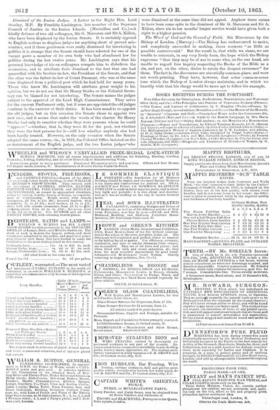Dismissal of the Ionian Judges. A Letter to the Right
Hon. Lord Stanley, M.P. By Franklin Lushington, late member of the Supreme Council of Justice in the Ionian Islands. (Macmillan and Co.)—A kindly defence of two old colleagues, Sir G. Marcoran and SirA. Xidian, who have been displaced by the Ionian Senate. It is certainly opposed to English notions to displace judges for anything short of proved mis- conduct, and if these gentlemen were really dismissed for interfering in politics it is strange that the Senate should.have selected for one of the vacant posts a member of its own body who had abandoned law for politics during the last twelve years. Mr. Lushington says that his personal knowledge of his ex-colleagues compels him to disbelieve the accusation, and to attribute their dismissal to the fact that one had quarrelled with his brother-in-law, the President of the Senate, and that the other was the father-in-law of Count Dusmani, who was at the same time displaced from a political post which he had held for many years. Those who know Mr. Lushington will attribute great weight to his opinion, but we do not see that Sir Henry Storks or the Colonial Secre- tary can be blamed for not interfering. The Senate names the judges subject to the approval of the Lord High Commissioner. They servo for the current Parliament only, but if none are appointed the old judges continue in the exercise of their duties. It has been usual to re-appoint the old judges, but on this occasion the Senate chose to appoint two new ones, and it seems that under the words of the charter Sir Henry Storks had only to consider whether they were persons whom he could approve "—whether, that is, they were fit for the post, not whether they were the best persons for it—still less whether anybody else had been hardly treated. However, on the only occasion when the Senate adopted the same course, viz., in 1834, the Colonial Office insisted on the re-instatement of the English judge, and the two Ionian judges*who were dismissed at the same time did not appeal. Anyhow there seems, to have been some spite in the dismissal of Sir G. Marcoran and Sir A. Xidian, since six to ten months' longer service would have given both a right to a higher pension.






























 Previous page
Previous page